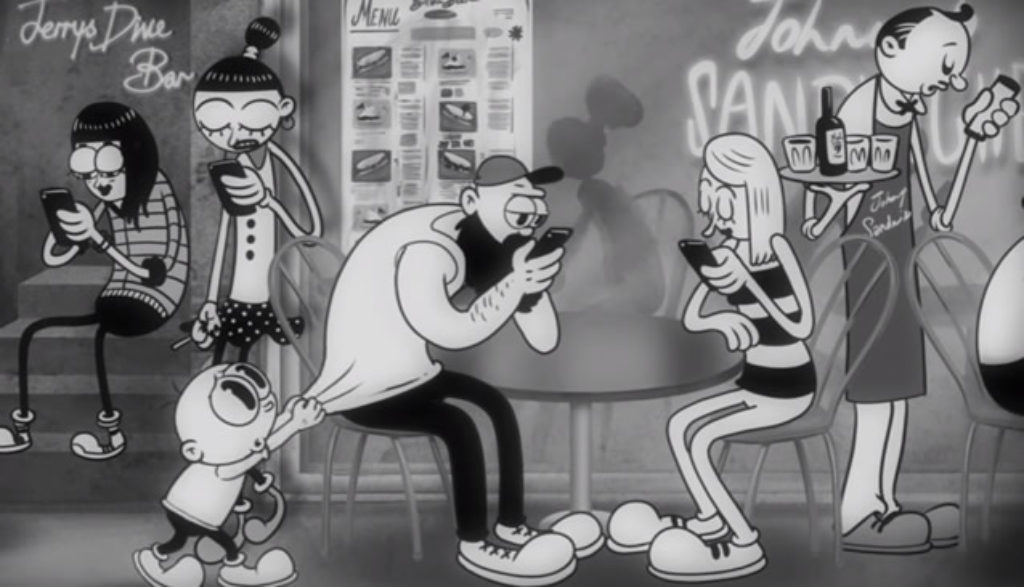
One of the great paradoxes of our time is this: Never have we been more connected, yet never have we been more disconnected. Professor Sherry Turkle captured this jarring juxtaposition of realities in her book title Alone Together. Now electronic music maestro Moby has a song that gets at this conundrum as well: “Are You Lost in the World Like Me?”
The song asks probing questions about navigating life in our tech-obsessed, postmodern world. And the remarkable video that accompanies it adds a poignant exclamation point of its own.
Our interconnected world makes many promises about making life better. But Moby’s not buying it. If anything, he suspects that things are getting worse.
The language he uses to describe his perspective hovers between bleak and downright apocalyptic in the song’s two brief verses. “Look harder, saying it’s done,” the singer begins. “Black days and a dying sun.” The second verse recapitulates that theme, with Moby saying, “Burn a courtyard, say it’s done/Throwing knives at a dying sun.” After each of those verses, he adds, “Look harder and you’ll find/The 40 ways it leaves us behind.”
But Moby contrasts those grim impressions with a desire for something better, perhaps something even divinely inspired: “Dream a dream of God-lit air/Just for a minute you’ll find me there.” A variant of that idea turns up in the second verse as well: “A source of love in the God-lit air/Just for a minute you’ll find me there.”
The song’s verses, while admittedly cryptic, paint a picture of a world in tension between light and dark, life and death. High stakes indeed.
If the verses give us this tension, the song’s repeated, question-filled chorus splits the difference without necessarily resolving it. Moby longs for connection, but admits he feels disoriented and lost. “Are you lost in the world like me?” he begins plaintively. “If the systems have failed/Are you free?/All the things, all the loss/Can you see?” Then we hear the song’s titular inquiry once more: “Are you lost in the world like me?”
The animated black-and-white video for the song was created by Steven Cutts and is done in the style of 1920s animator Max Fleisher. In it, a wide-eyed child roams through a world full of automatons who do nothing but stare at their smartphones.
Bent over and enslaved to their screens, they plunge down manholes. They snap selfies after a baby is born … never mind that the baby’s crawling away and no one notices. When a distraught young woman eases out onto a skyscraper ledge, apparently suicidal, all their camera phones focus on her. And when she jumps, they follow her all the way down and take pictures of the (offscreen) aftermath as the lone child without a phone sheds a tear.
Elsewhere, a buxom young woman snaps a selfie as a building burns in the background. A man is beaten by police as everyone around him films it. A family gobbles up a meal, each member focused zombie-like on his or her phone. All in all, the video critiques our obsession with beauty and selfies, with consumerism and screens of all kinds, with impersonal connections mediated through social media and dating apps.
In an interview with Rolling Stone, Cutts said of his visual take on Moby’s song, “For me the video is about our increasing dependence on technology and about human interaction today, or a certain lack of it. It focuses on the way tech is changing us—how we have become desensitized.”
The song gets at that troubling theme through unsettling images and unanswered questions. And the video rams it home with provocative power as it suggests that mindless addiction to technology is no different than lemmings plunging suicidally off a cliff.


After serving as an associate editor at NavPress’ Discipleship Journal and consulting editor for Current Thoughts and Trends, Adam now oversees the editing and publishing of Plugged In’s reviews as the site’s director. He and his wife, Jennifer, have three children. In their free time, the Holzes enjoy playing games, a variety of musical instruments, swimming and … watching movies.